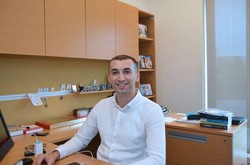The KAIST Herald interviewed a student from the first batch of internationals accepted to KAIST in 2007.
Please introduce yourself.
My name is Rashad Aliyev. I am from Azerbaijan. I first came to KAIST in 2007 as an undergraduate student in computer science. Currently, I am a PhD student in the School of Business and Technology Management.

How was your experience when you first came here?
When I first came, I was very young, not even 18 years old. So I was quite young for a foreign experience alone. There were a lot of tough times because the culture, the country, and the whole experience was totally new to me. There was a huge language barrier because not a lot of people spoke English and I didn’t know any Korean. I speak it well now, but back then I didn’t know the language. But there were a lot of nice experiences as well. I got to meet friends from all over the world and it was a very nice learning experience that gave me a chance to know myself better, grow up, and get a quality education.
It was in 2007 that the then newly elected president Nam-Pyo Suh decided to make it mandatory that all lectures were given in English. How did Korean students react to this policy change?
The decision [received] negative reactions from Korean students. I remember protests on campus. There were huge crowds making demonstrations with signs and banners. I also remember [joining them] before knowing what they were protesting against (laughs). KAIST was even tougher back then, so the additional burden of dealing with a foreign language was not well accepted. But the protests were aimed at the decision of the administration and not against international students.
What did international students do besides classes?
We had a few extra-curricular activities to participate in, the main one being the then newly established KISA. After seeing how the Graduate Students Association worked, we collectively created an identical structure for foreigners. Some students participated in KI House [Korean lessons]. But it was very tough for us to join Korean student clubs. I remember myself wanting to join the KAIST basketball club but being continuously ignored by the members. But after getting better in Korean, communications improved and I ended up playing basketball in the team for two years and made a lot of friends. In addition, internationals used to just gather and play football, go out to West Gate, Gungdong, etc. And after improving our Korean, we started exploring Daejeon and even going to Seoul. It was not easy because the infrastructure back then did not make it easy for us, but it was a great experience.
Do international students have it better now? Has KAIST changed over the years?
Definitely. When I came back last year I saw that a lot of things have changed. [Before], there was no ISSS. We only had the Student Affairs Team and the Academic Affairs Team that we would go to for everything ranging from school registration to visa and dormitory issues. In addition, [now] there are a lot of programs designed to help international students learn the language and culture better, a chance a lot of us never had. The reaction to foreigners in Korea has changed a lot (not only in KAIST). It still has a lot of room for improvement but it’s much better.
What made you come back here for PhD?
After finishing my undergrad in KAIST, I got a master’s degree in computer science from Korea University. I was accepted to study in an integrated MS-PhD program but I decided to go back home after getting my master’s degree. After teaching computer science in a university [in Azerbaijan] for a while, I wanted to further my studies by studying business and technology management. I had the chance to study in the US but I saw my undergraduate years in Korea as an investment to expand my network, and I wanted to build on that. Besides, KAIST is special to me since it was my school. So I decided to come back here.
Any advice for international students?
As KAIST students, everyone has to work hard and study well, but I would advise international students to not obsess over grades. If you obsess over it, you will miss out on a lot of stuff that could enrich your life as a professional. Later in life, people will value you not just for your studies or your grades, but for the human being that you are. The people you meet and friends you make here will be very important in your career. You don’t really know where life takes you so spend time to meet people and learn the language. In addition, be open to asking for help when you need it.

